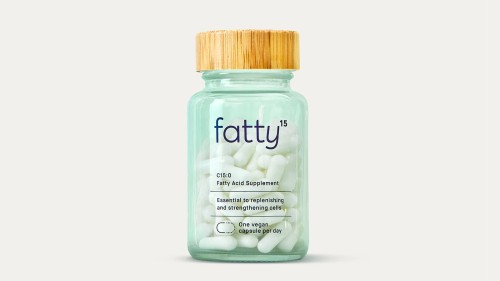WellnessVerge is reader-supported. We may earn a commission when you make a purchase through the links on this page. Learn more about our process here.
What to Know About Omega-3 Fatty Acids: Dietitian Explains Benefits and Sources
Last Updated on September 25, 2023
Medically Reviewed by Anthony Dugarte, MD
Omega-3s are essential fats that you must get from your diet. We explore these important nutrients, including their benefits, and how you can safely add them to your diet.


Your body needs a variety of nutrients in order to stay healthy, but there may be one nutrient you’re not getting enough of to optimize your health.
Omega-3 fatty acids are an essential part of our diet, but many people don’t know why they need them or what foods contain them.
We’ve made it easy for you — here’s why you need to know about omega-3 fatty acids, what they do for your body, and how to safely incorporate them into your life.
What Are Omega-3 Fatty Acids?
Omega-3 fatty acids belong to a class of fats called essential fatty acids. They are considered essential because we cannot make them within our own bodies, and they need to be obtained through foods in our diet.
The main dietary omega-3 fatty acids are alpha-linoleic acid (ALA), docosahexaenoic acid (DHA), and eicosapentaenoic acid (EPA).
ALA can be considered the primary omega-3 essential fatty acid because it can be converted into the longer-chained DHA and EPA. (1)
Unfortunately, the conversion rate of ALA to DHA and EPA is very low.
The conversion rate is limited even further when the relative intake of omega-6 fatty acids in the diet is too high. This is because ALA and omega-6s use the same enzymes for conversion.
12 Benefits of Omega-3s
Omega-3 fatty acids have been studied for a number of disease states and ways to optimize health. Below are some of the benefits associated with omega-3 fatty acids.
1. May Reduce Heart Disease Risk
Omega-3 fatty acids are beneficial for heart health and are associated with a reduced risk of coronary heart disease and heart failure. (2)
In individuals with elevated triglycerides (200 mg/dL or higher), supplementation with EPA or EPA plus DHA significantly reduces triglyceride levels and decreases the risk of atherosclerotic cardiovascular disease, with EPA also modestly decreasing LDL cholesterol. (3)
Fish and fish oil supplementation is also effective in primary and secondary heart failure prevention by reducing inflammation, preventing cardiac fibrosis (scar tissue), decreasing blood pressure, and increasing nitrous oxide production. (4)
It may also reduce the risk of blood clots and other heart conditions.
2. May Support Brain Health
Omega-3 fatty acids are essential for brain health throughout the lifespan, particularly DHA.
During fetal development and early infancy, DHA contributes to brain development and cognitive performance. (5)
DHA supplementation is also found to impact brain function throughout the lifespan by improving memory, helping with behavior and mood, protecting against cognitive decline (including dementia and mild Alzheimer’s disease), and improving sustained attention. (6, 7)
Supplementation with DHA may also help with recovery from mild traumatic brain injuries and concussions. (8)
3. May Assist with Balanced Immune Function
Immune system activity is regulated by omega-3 fatty acids through their impact on inflammation and the function of immune cells.
Omega-3s help decrease inflammation by reducing the production and activity of inflammatory cytokines. (9)
And while these fatty acids may inhibit the activity of certain immune cells, they can actually improve certain immune functions within the cell to keep your immune system balanced. (10)
Studies find that omega-3s can be useful for reducing symptoms in autoimmune conditions.
4. May Help Protect the Eyes
The eyes contain sensitive tissues that are frequently exposed to oxidative stress and utilize omega-3 fatty acids more than other types of fat.
Functions of omega-3s in the eyes include improving dry eye, reducing the risk for age-related macular degeneration (AMD), and preventing diabetic retinopathy.
A 2019 meta-analysis of clinical trials found that omega-3 fatty acid supplementation significantly improved dry eye symptoms. (11)
DHA and EPA supplementation also decreased inflammation in the cornea, increased the volume of tears, and helped maintain the integrity of the cornea.
In age-related macular degeneration, observational studies find that low intake of omega-3 fatty acids was associated with a greater incidence of AMD compared to those with higher intakes. (12)
Currently, there isn’t much research on the efficacy of omega-3 supplementation in preventing the progression of AMD. (13)
Omega-3 fatty acids may also protect retinal health by preventing the progression of diabetic retinopathy. (14)
5. May Improve Physical Performance
Athletes and those who are physically active on a regular basis may also benefit from omega-3 supplementation.
A 2020 review found that EPA and DHA supplementation may be beneficial for delaying the onset of muscle soreness after exercise, improving exercise endurance and performance, enhancing exercise recovery, reducing the risk of injury and illness, and decreasing exercise-induced inflammatory responses. (15)
Supplementation with EPA and DHA may also help with increasing muscle mass and strength and decreasing joint pain. (16)
6. May Help Support Mental Health
The benefits of omega-3s may reach beyond just brain development but for mental health treatment.
Omega-3 fatty acids may regulate the production of dopamine within the body. Low levels of omega-3s in the brain may be a risk factor for disorders in which brain dopamine is dysregulated, including attention deficit hyperactivity disorder, Parkinson’s disease, schizophrenia, and depression. (17)
For individuals who are already affected by depression or depressive symptoms, dietary supplementation with omega-3 fatty acids may help reduce the severity of symptoms. (18)
There are some limitations on the existing research, including variability in results and dosing of omega-3s, so more research needs to be done.
7. May Help with Maintaining Gut Health
Emerging research finds that omega-3 supplementation could be beneficial to gut health and the gut-brain axis.
Omega-3 supplementation can help restore balance to the gut microbiota by promoting the presence of helpful bacteria. (19)
This, in turn, helps reduce inflammation and helps maintain the integrity of the intestines.
The anti-inflammatory effects of omega-3s may also protect the gut from inflammation that arises from pathogens and chronic conditions. (20)
8. May Help with Endocrine Conditions
Omega-3 fatty acids may have a positive impact on symptoms that arise from endocrine diseases and hormonal imbalances.
A 2018 meta-analysis found that omega-3 fatty acid supplementation may be effective for improving insulin resistance, reducing total and LDL cholesterol, and reducing triglycerides in women with PCOS. (21)
An animal study examining the impact of a diet rich in fish oil on thyroid hormone signaling found that rats fed the fish oil diet had liver activity indicating greater thyroid hormone action and also had lower body weight, triglycerides, and cholesterol. (22)
Individuals experiencing PMS may also benefit from omega-3 supplementation.
A 2017 clinical trial found that omega-3 supplementation in women aged 20–35 who suffered from PMS symptoms had reduced physical and emotional symptoms of PMS and reported increased quality of life. (23)
9. May Support Healthy Pregnancy and Lactation
Intake of omega-3 supplements for pregnancy and lactation not only benefits fetal and infant development, but it is beneficial for pregnant persons as well.
Even prior to becoming pregnant, omega-3 supplementation helps promote fertility. (24)
During pregnancy, omega-3s help reduce the risk of premature delivery, improve infant birth weight, decrease preeclampsia risk, and increase transmission of omega-3s to the fetus during gestational diabetes. (25)
During breastfeeding, omega-3 supplementation helps increase the omega-3 content of breast milk, which in turn contributes to the neuronal development of infants.
10. May Help with Autoimmune Conditions
As noted earlier, omega-3 supplementation helps modulate the immune response and can decrease symptoms of autoimmune conditions.
A 2019 review examining the therapeutic potential of omega-3s and autoimmune conditions supports fish oil supplementation for the prevention and treatment of autoimmune diseases, including systemic lupus erythematosus (SLE), multiple sclerosis, rheumatoid arthritis, and type-1 diabetes. (26)
In individuals with rheumatoid arthritis, omega-3 supplementation reduced NSAID use, decreased joint stiffness, joint swelling and tenderness, and reduced an inflammatory marker. (27)
People with multiple sclerosis taking omega-3 supplements had improvements in inflammatory markers, reduced relapse rate, and overall quality of life (though more studies need to be done to see how effective supplementation is). (28)
Studies found that people with SLE had reductions in inflammation, fatigue, decreased disease activity, and decreased cardiovascular risk. (29)
Children may benefit from fish oil supplementation early in life to reduce the risk of autoimmunity that could trigger the development of type 1 diabetes. (26)
11. May Reduce Risk Factors for Metabolic Syndrome
Metabolic syndrome can be defined as a group of risk factors that increase your risk for chronic diseases, including heart disease and diabetes.
Omega-3 supplements are being considered for the prevention of metabolic syndrome.
In a review of metabolic syndrome and omega-3 fatty acids, these fatty acids may be helpful in maintaining weight loss or preventing further weight gain, improving lipid metabolism, reducing inflammation from fat tissue, and improving hormone regulation. (30)
Sources of Omega-3 Fatty Acids
Now that you know why omega-3s are important for your body, let’s talk about how you can add them to your diet.
ALA Sources
ALA can be found in a variety of foods but are in the highest concentration in plant-based sources.
Some of the top sources of ALA include:
- Flaxseed and flaxseed oil
- Chia seeds
- Hemp seeds
- English walnuts
- Black walnuts
- Canola oil
- Soybean oil
- Kidney beans
- Edamame
EPA + DHA Sources
The elongated omega-3 fatty acids EPA and DHA are primarily found in fish and seafood but are also present in algae.
Sources of EPA and DHA include:
- Salmon
- Sardines
- Mackerel
- Rainbow trout
- Oysters
- Anchovies
- Sea bass
- Shrimp
- Tuna
- Cod
- Tilapia
- Scallops
- Lobster
- Algae (including seaweed, nori, chlorella, and spirulina)
Related: 12 Foods That Are Very High in Omega-3, According to a Dietitian
Omega-3 Supplements
Omega-3 supplements are available in vegetarian, vegan and non-vegetarian sources.
Supplements that include DHA and EPA include algal oil, fish oil, krill oil, and cod liver oil.
ALA supplements also exist and are often sourced from flaxseed, chia seeds, and hemp seeds.
To increase the absorption of your omega-3 supplement, you should have it with a meal containing dietary fat. (31)
It’s also recommended to choose an emulsified omega-3 supplement over a capsule supplement because it is better absorbed even if not taken with a meal.
How Much Omega-3s Should You Have Daily?
The amount of omega-3s fatty acids needed daily may differ from person to person based on their age, lifestyle, and state of health, but there are some general guidelines.
ALA is the only omega-3 fatty acid that has a Dietary Reference Intake (DRI) developed by the National Academy of Medicine (formerly known as the Institute of Medicine). (32)
For men over 18, the daily recommendation is 1.6 g/day while women should aim for 1.1 g/day.
During pregnancy and breastfeeding, ALA intake needs to increase to 1.4 g/day and 1.3 g/day, respectively.
Despite there not being a set of recommendations for the consumption of EPA and DHA, the Dietary Guidelines for Americans 2020–2025 recommends that adults eat approximately 8–10 oz of seafood per week depending on their calorie needs (which would provide approximately 250 mg of DHA and EPA per day). (33)
For women who are pregnant or lactating, the Dietary Guidelines recommends intake between 8–12 oz of seafood per week from sources low in methylmercury.
Other national and international organizations recommend intake of seafood to provide between 200–300 mg of DHA daily with additional EPA for women of child-bearing age and pregnant women. (34)
The Institute of Medicine did not establish an upper limit for the intake of omega-3 fatty acids, but the FDA recommends limiting EPA and DHA intake to a maximum of 3 g/day, with up to 2 g/day coming from dietary supplements. (35)
Side Effects and Safety
Omega-3 fatty acids are generally safe, but there are some things to consider before starting an omega-3 supplement or adding certain omega-3-containing foods to your diet.
A 2018 review and meta-analysis of the safety and tolerability of prescription omega-3 fatty acids found that common side effects included: (36)
- Fishy taste
- Skin abnormalities, including rash
- Belching
- Nausea
Some blood laboratory markers were also mildly impacted including elevated fasting blood sugar, changes in red blood cells, and mild elevation of LDL cholesterol.
Other potential side effects of omega-3 supplementation may include heartburn, stomach discomfort, diarrhea, and headache.
High doses of omega-3 fatty acids may increase the risk of bleeding due to reducing the ability of the blood to clot and increasing potential vulnerability to free radicals. (16)
Omega-3 supplementation may be contraindicated in individuals taking warfarin, aspirin, or other anticoagulant medications. Its synergistic effects may increase the risk of bleeding in these individuals.
Excessive cod liver oil consumption may lead to vitamin A toxicity. (37)
Omega-3 Controversies
As noted above, omega-3 fatty acids are often used for cardiovascular health, but high-dose omega-3 supplementation may increase the risk of atrial fibrillation (AFib, also known as arrhythmia).
A 2021 review of clinical trials found that there may be a dose-dependent relationship between omega-3 intake and AFib, with a significant increase in risk at an intake of 4 g/day or higher. (38)
Consumers have also had concerns about the risk of fish oil supplementation with increased prostate cancer risk.
A 2016 review on fish oil-derived omega-3 fatty acids and prostate cancer found that the evidence is currently insufficient to determine if there is a relationship between fish oil and prostate cancer risk. (39)
Many of the studies included were found to have high bias and unclear conclusions, so more research needs to be done.
Allergies
If you have an allergy to fish or seafood, there is little evidence on whether fish-derived omega-3 supplements are safe for you.
One small pilot study conducted in 2008 of six participants found that individuals who were allergic to finned fish did not have any skin or oral reactions to taking fish oil supplements. (40)
More research needs to be done before any definitive stance on the safety of fish oil supplements in individuals allergic to fish and seafood.
If you are allergic to fish or seafood, it may be safer to take an algal-based omega-3 supplement.
Before taking any type of supplement, I recommend speaking with your doctor to see if it is safe for you and to monitor yourself for any type of symptoms that could be indicative of a supplement interaction.
Concerns About Mercury in Fish
There are risks associated with excessive fish intake due to mercury contamination in water sources.
Toxic exposure to mercury can cause damage to the central nervous system, induce hypertension, and potentially lead to death. (41)
High exposure to mercury during pregnancy can increase susceptibility to metabolic syndrome in infants in addition to damaging the central nervous system. (42)
Seafoods high in mercury, such as shark, swordfish, and king mackerel, should be avoided during pregnancy.
The FDA and EPA have a full list of seafood choices based on mercury amount and how many servings are safe to eat per week available here. (43)
The Bottom Line
Omega-3 fatty acids have an impact on every system of your body and can help with a number of health conditions.
Though there may be some potential health concerns associated with omega-3 supplementation, the benefits of having omega-3s in your diet are hard to deny.
You can get your omega-3s through a variety of fish, seafood, and plant-based foods so that it’s easier to fit into your preferred eating style.
If you do want to incorporate more omega-3 fatty acids into your diet, I would recommend speaking with your doctor first to see what would be the best way to do so.
A registered dietitian can also help you figure out creative ways to add omega-3 foods to your snacks and meals.
At WellnessVerge, we only use reputable sources, including peer-reviewed medical journals and well-respected academic institutions.
- Past and Present Insights on Alpha-linolenic Acid and the Omega-3 Fatty Acid Family:
https://pubmed.ncbi.nlm.nih.gov/25774650/ - Omega-3 fatty acids in coronary heart disease: Recent updates and future perspectives:
https://pubmed.ncbi.nlm.nih.gov/30230571/ - Omega-3 Fatty Acids for the Management of Hypertriglyceridemia: A Science Advisory From the American Heart Association:
https://www.ahajournals.org/doi/full/10.1161/CIR.0000000000000709 - Marine Omega-3 (N-3) Fatty Acids for Cardiovascular Health: An Update for 2020:
https://pubmed.ncbi.nlm.nih.gov/32085487/ - DHA Effects in Brain Development and Function:
https://pubmed.ncbi.nlm.nih.gov/26742060/ - Brain Health across the Lifespan: A Systematic Review on the Role of Omega-3 Fatty Acid Supplements:
https://pubmed.ncbi.nlm.nih.gov/30111738/ - A Recent Update on the Effects of Omega-3 Fatty Acids in Alzheimer's Disease:
https://pubmed.ncbi.nlm.nih.gov/30084334/ - ω-3 fatty acid supplementation as a potential therapeutic aid for the recovery from mild traumatic brain injury/concussion:
https://pubmed.ncbi.nlm.nih.gov/24829473/ - Marine omega-3 fatty acids and inflammatory processes: Effects, mechanisms and clinical relevance:
https://pubmed.ncbi.nlm.nih.gov/25149823/ - Effects of Omega-3 Fatty Acids on Immune Cells:
https://pubmed.ncbi.nlm.nih.gov/31614433/ - Efficacy of Omega-3 Fatty Acid Supplementation for Treatment of Dry Eye Disease: A Meta-Analysis of Randomized Clinical Trials:
https://pubmed.ncbi.nlm.nih.gov/30702470/ - Nutritional supplements in age-related macular degeneration:
https://onlinelibrary.wiley.com/doi/full/10.1111/aos.12650 - The value of nutritional supplements in treating Age-Related Macular Degeneration: a review of the literature:
https://pubmed.ncbi.nlm.nih.gov/31313070/ - Omega-3 fatty acids in prevention of diabetic retinopathy:
https://pubmed.ncbi.nlm.nih.gov/28481011/ - Omega-3 Fatty Acids for Sport Performance—Are They Equally Beneficial for Athletes and Amateurs? A Narrative Review:
https://www.ncbi.nlm.nih.gov/pmc/articles/PMC7760705/ - Omega-3 Polyunsaturated Fatty Acids: Benefits and Endpoints in Sport:
https://www.ncbi.nlm.nih.gov/pmc/articles/PMC6357022/ - N-3 (Omega-3) Fatty Acids: Effects on Brain Dopamine Systems and Potential Role in the Etiology and Treatment of Neuropsychiatric Disorders:
https://pubmed.ncbi.nlm.nih.gov/29651972/ - Omega-3 Fatty Acids and Depression: Scientific Evidence and Biological Mechanisms:
https://www.ncbi.nlm.nih.gov/pmc/articles/PMC3976923/ - Impact of Omega-3 Fatty Acids on the Gut Microbiota:
https://pubmed.ncbi.nlm.nih.gov/29215589/ - Associations among Dietary Omega-3 Polyunsaturated Fatty Acids, the Gut Microbiota, and Intestinal Immunity:
https://www.ncbi.nlm.nih.gov/pmc/articles/PMC7801035/ - Effectiveness of Omega-3 fatty acid for polycystic ovary syndrome: a systematic review and meta-analysis:
https://www.ncbi.nlm.nih.gov/pmc/articles/PMC5870911/ - Effects of dietary fish oil on thyroid hormone signaling in the liver:
https://www.sciencedirect.com/science/article/abs/pii/S0955286309001685 - The effect of omega 3 fatty acid supplementation on premenstrual syndrome and health-related quality of life: a randomized clinical trial:
https://pubmed.ncbi.nlm.nih.gov/28707491/ - Omega-3 Fatty Acids and Fecundation, Pregnancy and Breastfeeding:
https://pubmed.ncbi.nlm.nih.gov/32232824/ - Effects of omega-3 fatty acids in prevention of early preterm delivery: a systematic review and meta-analysis of randomized studies:
https://pubmed.ncbi.nlm.nih.gov/26773247/ - Therapeutic Potential of ω-3 Polyunsaturated Fatty Acids in Human Autoimmune Diseases:
https://www.ncbi.nlm.nih.gov/pmc/articles/PMC6776881/ - Therapeutic Potential of ω-3 Polyunsaturated Fatty Acids in Human Autoimmune Diseases:
https://pubmed.ncbi.nlm.nih.gov/31611873/ - Effect of omega-3 fatty acids and fish oil supplementation on multiple sclerosis: a systematic review:
https://pubmed.ncbi.nlm.nih.gov/31462182/ - Omega-3 Fatty Acids in Rheumatic Diseases A Critical Review:
https://journals.lww.com/jclinrheum/Fulltext/2017/09000/Omega_3_Fatty_Acids_in_Rheumatic_Diseases__A.6.aspx - Omega-3 fatty acids in obesity and metabolic syndrome: a mechanistic update:
https://pubmed.ncbi.nlm.nih.gov/29621669/ - Strategies to improve bioavailability of omega-3 fatty acids from ethyl ester concentrates:
https://pubmed.ncbi.nlm.nih.gov/30550388/ - Dietary Reference Intake (DRI):
https://www.nap.edu/read/10490/chapter/10 - Dietary Guidelines for Americans 2020-2025:
https://www.dietaryguidelines.gov/ - Dietary Intakes of EPA and DHA Omega-3 Fatty Acids among US Childbearing-Age and Pregnant Women: An Analysis of NHANES 2001–2014:
https://www.ncbi.nlm.nih.gov/pmc/articles/PMC5946201/ - Omega-3 Fatty Acids Fact Sheet for Health Professionals:
https://ods.od.nih.gov/factsheets/Omega3FattyAcids-HealthProfessional/ - Safety and tolerability of prescription omega-3 fatty acids: A systematic review and meta-analysis of randomized controlled trials:
https://pubmed.ncbi.nlm.nih.gov/29482765/ - Hypervitaminosis A Following Long-Term Use of High-Dose Fish Oil Supplements:
https://journal.chestnet.org/article/S0012-3692(15)41043-8/fulltext - Omega-3 Fatty Acids and Atrial Fibrillation:
https://jamanetwork.com/journals/jama/fullarticle/2777450 - Fish-Derived Omega-3 Fatty Acids and Prostate Cancer: A Systematic Review:
https://pubmed.ncbi.nlm.nih.gov/27365385/ - Are fish oil supplements safe in finned fish-allergic patients?:
https://pubmed.ncbi.nlm.nih.gov/18926060/ - Toxic Effects of Mercury on the Cardiovascular and Central Nervous Systems:
https://www.ncbi.nlm.nih.gov/pmc/articles/PMC3395437/ - Association of Fish Consumption and Mercury Exposure During Pregnancy With Metabolic Health and Inflammatory Biomarkers in Children:
https://pubmed.ncbi.nlm.nih.gov/32176304/ - Questions & Answers from the FDA/EPA Advice about Eating Fish for Women Who Are or Might Become Pregnant, Breastfeeding Mothers, and Young Children:
https://www.fda.gov/food/consumers/questions-answers-fdaepa-advice-about-eating-fish-women-who-are-or-might-become-pregnant






